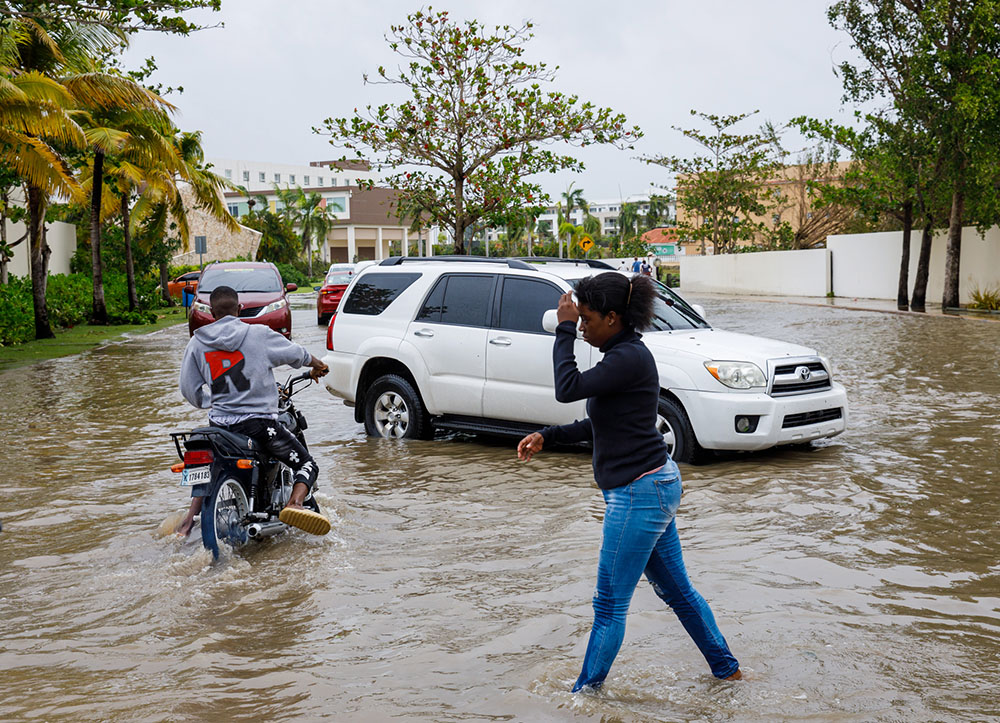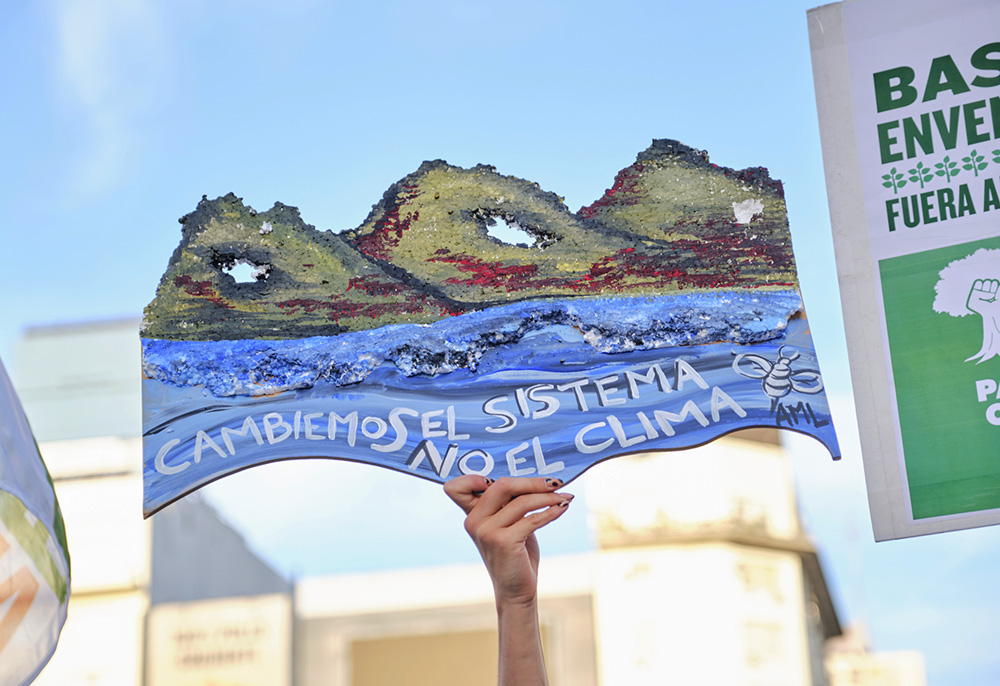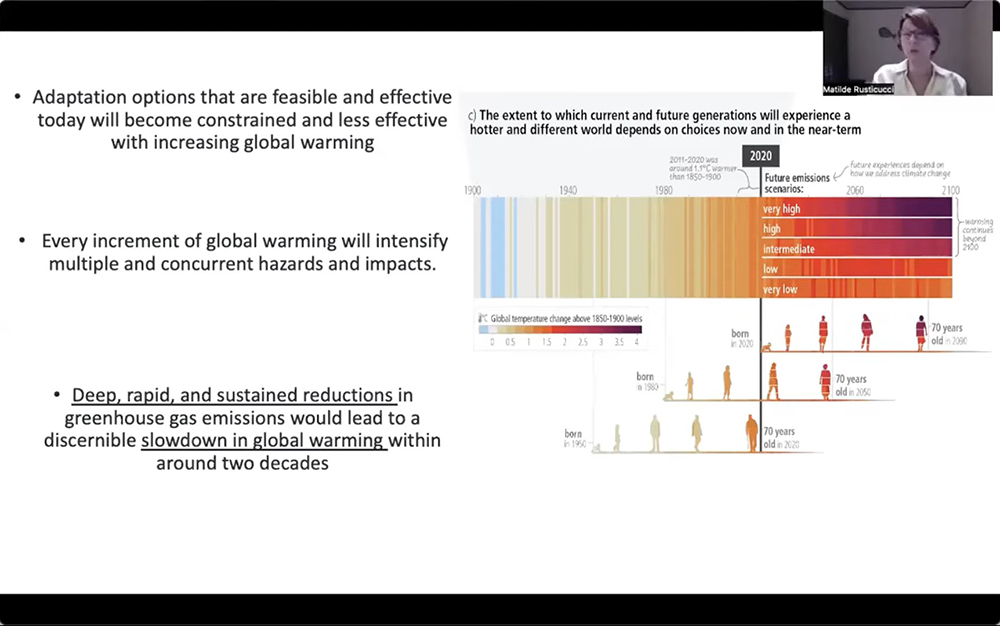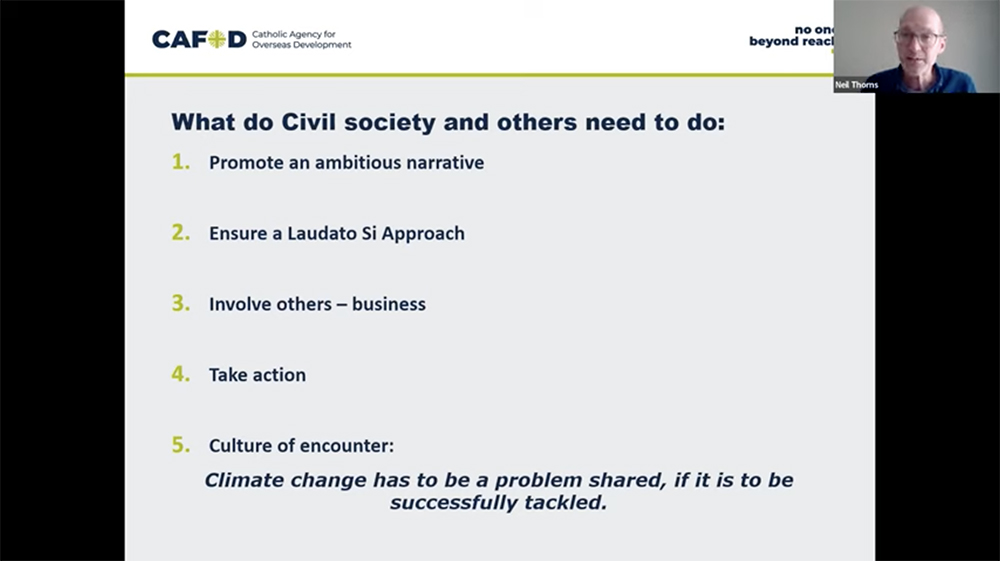
A flooded street is seen Sept. 19, 2022, in Bávaro, Punta Cana, Dominican Republic, in the aftermath of Hurricane Fiona. (Dreamstime/Aleksandr Rybalko)
The time of delayed action on climate change must end, a coalition of Catholic organizations said in a message to governments in response to the latest major United Nations climate report, which stated the world can still hold temperature rise below far more dangerous levels if countries rapidly slash heat-trapping emissions now.
The March 30 letter was organized by Laudato Si' Movement, an international network of 900-plus Catholic institutions united around combating climate change and environmental degradation. The letter came in response to the sixth synthesis report of the U.N.'s Intergovernmental Panel on Climate Change (IPCC), viewed as the world's foremost scientific body on climate change.
That report, issued March 20, concluded that despite continuing increases in greenhouse gas emissions, a narrow pathway still exists to hold average global temperature rise to 1.5 degrees Celsius — the higher ambition temperature target nations adopted under the 2015 Paris Agreement — if countries take immediate and sustained actions in the next seven years to drastically reduce greenhouse gas emissions across all sectors.
The report also emphasized that every decimal point of warming matters, so any heating averted lessens suffering faced by ecosystems and humans, particularly in countries and communities most vulnerable to climate change impacts.
"The choices and actions implemented in this decade will have impacts now and for thousands of years," the report stated.

A protester holds up a sign saying in Spanish, "Let's change the system, not the climate," during a climate strike in Buenos Aires, Argentina, March 3. (Dreamstime/Carolina Jaramillo)
The IPCC report "has strengthened the resolve of Catholic actors to advocate for climate action now," Laudato Si' Movement said in its letter, which it will present to national delegates at U.N. headquarters in New York City ahead of Earth Day (April 22). The letter is open for other Catholic groups to sign on, with 100 signatures so far, most representing organizations.
"As Catholics, united with the voice of Pope Francis, we call on our governments to achieve collective ecological conversion," the letter said, referring to a repeated plea from the pope for renewal of a more harmonious relationship between humanity and the rest of the created world.
In terms of specific policy actions, the Catholic groups urge governments to end all subsidies for fossil fuels and redirect them toward clean energy. The letter called on countries to close the gap between their pledges and current actions — around both emissions reductions and financing for developing nations — and to realign climate mitigation pledges with what is necessary to hold temperature rise to 1.5 C.
On financing, the letter pressed developed nations to deliver on the $100 billion annually for climate mitigation and adaptation in developing nations, and to inject new dollars into the loss and damage fund established at the COP27 U.N. climate summit to compensate vulnerable countries for climate impacts they have already faced. The letter added that financing from developed nations to developing nations should not come in the form of new debt and should be directed toward local communities in addition to national governments.
Advertisement
In addition, Laudato Si' Movement reiterated its support of a Fossil Fuel Non-Proliferation Treaty that calls for an immediate end to all new coal, oil and gas projects and a just transition to renewable energy.
"Sustained attention to galvanizing social and political will to finance and enact these projects must now be the primary goal of all citizens and should be a particularly high priority for governments who have the responsibility to care for their citizens, especially the most vulnerable," Laudato Si' Movement said in the letter.
"We believe that the time is now. No more delays are acceptable."
The IPCC synthesis report was a summary of three reports the climate science body issued between 2021 and 2022. Each individual report focused on a different aspect of climate change: the physical science, present and future impacts and adaptation, and mitigation.
The synthesis report reiterated that already the world has heated 1.1 degrees Celsius above preindustrial (1850-1900) levels, primarily due to human activities through a century of burning fossil fuels that release heat-trapping greenhouse gases. The resulting heating of the atmosphere has led to more frequent and intense heat waves and droughts, more frequent and destructive flooding, and higher intensity storms.
As many as 3.6 billion people live in areas highly vulnerable to climate change, the report stated, and millions already face acute food and water insecurity, especially in the Global South and among Indigenous communities. In addition, hundreds of species have been lost, and some ecosystems, like the Arctic, are approaching irreversible tipping points.

Matilde Rusticucci, a climate scientist at the University of Buenos Aires, discusses the sixth synthesis climate report from the United Nations Intergovernmental Panel on Climate Change during a webinar March 30 hosted by the Laudato Si' Movement. (NCR screenshot)
"These impacts are driven by changes in multiple physical climate conditions that are increasingly attributed to human influence," Matilde Rusticucci, a climate scientist at the University of Buenos Aires and co-author of past IPCC reports, said during a March 30 webinar hosted by Laudato Si' Movement, breaking down the report and its ramifications from a faith perspective.
The latest IPCC report identified three major gaps:
- Emissions, where current national pledges would limit warming to just 2.8 C;
- Implementation, where current policies project to warming of 3.2 C;
- Financing, where funding is lacking for adaptation and loss and damage, while the majority is focused on mitigation but still falls short of levels necessary to limit global warming to 1.5 C or even 2 C.
The IPCC synthesis report restated that in order to meet that 1.5 C target, global emissions must peak no later than 2025 and be slashed by 43% by 2030 on the way to net-zero by midcentury. Even in the lowest-emissions scenarios, efforts to remove carbon emissions from the atmosphere will need to be deployed. Sustained reductions in emissions would result in "a discernible slowdown in global warming within around two decades," the IPCC report stated.
According to the report, the current trajectory means the planet is more likely than not to exceed the 1.5 C threshold sometime in the 2030s. And between now and 2040, every region on Earth is projected to see increases in climate hazards with risks to both humans and ecosystems.
"No, we are not doing enough," Neil Thorns, advocacy director with CAFOD (the Catholic development agency of England and Wales) and a past member of the Holy See delegation at U.N. climate conferences, said during the webinar.

Neil Thorns, advocacy director with CAFOD (the Catholic development agency of England and Wales) and a past member of the Holy See delegation at U.N. climate conferences, speaks during a webinar March 30 hosted by the Laudato Si' Movement. (NCR screenshot)
He stressed that the likelihood of eclipsing 1.5 C temperature rise does not mean the world should abandon the goal, but rather continue pressing forward.
"We keep the ambition, and we keep it absolutely as strong and ambitious as we possibly can," Thorns said.
The veteran of numerous U.N. climate summits added that the various gaps make COP28, the next international climate meeting, set for late November in Dubai, all the more critical. At that meeting, nations will conclude the first global stock-take assessing progress by governments in meeting the Paris Agreement.
That, combined with the scientific report, Thorns said, will hopefully place more pressure on countries to increase ambition and action in their next national pledges, which are due in 2025.
"There is a revolution out there waiting if we can invest in it and if we can make it positive," he said, pointing to rapidly decreasing costs of wind and solar and recent positive policy moves by the U.S., through the Inflation Reduction Act, and the European Union.
While adaptation measures have progressed, those efforts will become less effective if temperatures continue to rise, Rusticucci said.
"Global climate policy should understand that if we continue with this economic politics, the costs of recovering from negative impacts are greater than the costs of changing the current production model for one that stops emitting greenhouse gasses," she said.
Other speakers during the webinar highlighted the present-day impacts of climate change that the IPCC report documented. Martha Phiri, a climate justice advocate and policy researcher with the Jesuit Center for Ecology and Development, in Malawi, described how prolonged droughts and dry spells have intensified food insecurity and pushed people into poverty as rural farmers have lost full crops, while more than 2 million people have been impacted by Cyclone Freddy, which struck earlier in March.
Aditya Rodriguez, a member of the Bangladesh Catholic Student Movement, said that while news reports and documentaries have illustrated the dire situation facing humanity and the planet, witnessing the impacts of climate change, such as the devastating flooding that submerged one-third of Bangladesh last summer, makes it unavoidable.
In the letter to U.N. delegates, Laudato Si' Movement noted that awareness has never been higher of the various environmental crises facing the planet, "so there is now a real opportunity to work towards effective international action."
"And there is now a clear and urgent need to do so as highlighted in this new report," it said.









